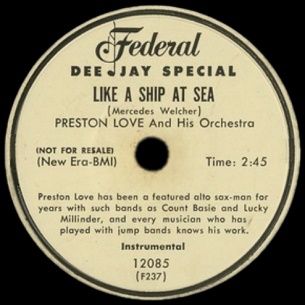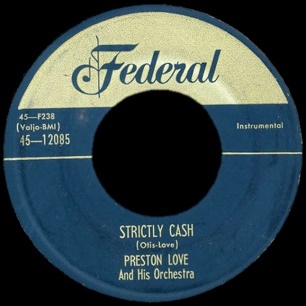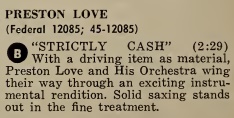Preston Love: “Strictly Cash”
13 Saturday May 2023
Written by Sampson
FEDERAL 12085; JULY 1952

Pay up!
Though I’m guessing if this was one of those sites charging to read their content this record would earn pennies on the dollar, if that.
It’s not that Preston Love wasn’t a good musician – he was talented and versatile with admirable longevity – but he was never a star, rarely even a lead artist, and remains most known in rock circles (and by “most” I mean “known by a select few who are vaguely aware of early rock and their associated artists”) as a friend of Johnny Otis who got Love his contract with Federal Records for whom he’s recording for here.
But like many jazz-reared saxophonists, Love was still only an occasional interloper in rock circles and so even on more focused attempts such as this the wary fan is going to be hesitant to give their hard earned dough over to a guy who won’t likely be sticking around very long.
Or to put it another way… the buck stops here.
Money Up Front
So let’s go down our all too obvious checklist of Preston Love topics to make sure we’re all up to date.
We mentioned he’s a sax player and a jazz musician at heart who played with some big name bands, Count Basie most prominently, and was almost like a brother to Johnny Otis with whom he wrote a few rock songs and played on a few sessions.
In the future he would frequently dabble in rock, including some good greasy funky instrumentals in the late 1960’s, but he was always one of those guys who was generally a better musician than his solo recorded output would indicate.
This contract with Federal (done as a favor to Otis by Ralph Bass who when he signed Love was still anticipating Johnny joining up with him as soon as he was able before Otis double-crossed him and went to Mercury instead) being his first opportunity to cut records under his own name, Love was certainly torn about what to showcase.
Should he stick to jazz, which was still his primary vocation, or should he instead focus on actually getting a hit, in which case rock ‘n’ roll was his only real viable option?

In the end he tried both, as the flip side was the dreary poppish Like A Ship At Sea and to a rock fan it might as well be lost at sea, if not sinking altogether. But that’s obviously stylistic bias talking and so if Love wanted to earnestly pursue that type of thing, who are we to criticize when we can simply ignore it and focus on the big money tracks we prefer.
Always remember though, when it comes to relative outsiders getting in the door for rock membership we have a Strictly Cash rule… absolutely no credit or I.O.U.’s accepted.
Since Love freely hands over a wad of crisp bills with this record to show he’s serious about his attempts in this field we’ll happily let him in and allow him to groove with us… and for us.
Big Bucks
One thing in the rundown that we sort of skipped over was that as crucial as he was to rock’s development and popularity, Johnny Otis was also steeped in big band jazz which brought elements of that into his work which gave him his own little niche within the rock field.
But while you might assume that since Otis is present and accounted for on this session, playing vibes and bringing along his own drummer, Leard Bell, to supplement Love’s group, he might encourage his friend to show off his more serious musical chops which would also let Johnny himself scratch that particular itch for a change. Instead he makes sure they don’t lose sight of the primary objective which was rock acceptance and the added sales that goes with it.

Because of that it’s hardly surprising that Otis co-wrote – and surely arranged – the song and kept it as tightly focused as possible. As a result Strictly Cash hums along at a sprightly clip while being muscular enough to pass the visual inspection of skeptical rock fans, yet flexible enough to earn their trust as it unfolds. It’s not a exceptionally dense track or anything but it does have nicely overlapping parts which allows you to focus on multiple instruments along the way and get a slightly different vibe from the same record as a result.
The primary rhythm is given over to Hampton Hawes’ piano which is more prominent in the mix at the start in order to set the groove. When Love takes his solo the piano cedes the spotlight even as it remains locked in while buried further in the mix. Love is not a honker by trade and the alto is not the saxophone for that if he were, but his tight economical lines show that they’re aware of the requirements of the idiom regardless of the horn. These are shorter rhythmic grooves rather than extended melodic treatises.
Even after Otis’s vibes solo, which is much better than the words “vibe solo” would have you think as he shows he’s still got his drummer’s mentality intact, Love returns with a bit more melodic leeway, though not letting himself get carried away in the process and is probably trying to just give the upcoming extended coda something to break away from since at that point he resumes his stuttering riffs which are catchy and danceable.
Not surprisingly those are probably the two attributes a record like this needs in order to connect with the rock audience and in meeting those goals they’ve succeeded in their task and won us over with room to spare.
Cashing In
Granted, as solidly constructed and as capably played as all of this is, it’s not something so memorable that it will become a big hit, but it serves as an ideal record to set the proper mood for a party which is about all Federal Records could’ve realistically hoped for.
Once upon a time jazz records had done the same thing of course but the means with which they were doing it today in rock ‘n’ roll showed the approaches had been slightly altered – aiming for compact rather than complex.

That Love shows he was capable of satisfying the new breed of listener with Strictly Cash is a testament to his musical capabilities, but his split intentions on the drastically different sides of the record was also a sign that he was not going to concentrate fully on this approach in order to maximize his chances for individual stardom.
Still, if Preston Love wanted to at least keep his hand in the rock fans pocket, a record like this certainly wasn’t going to get his wrist slapped while being told to keep away.
SPONTANEOUS LUNACY VERDICT:


